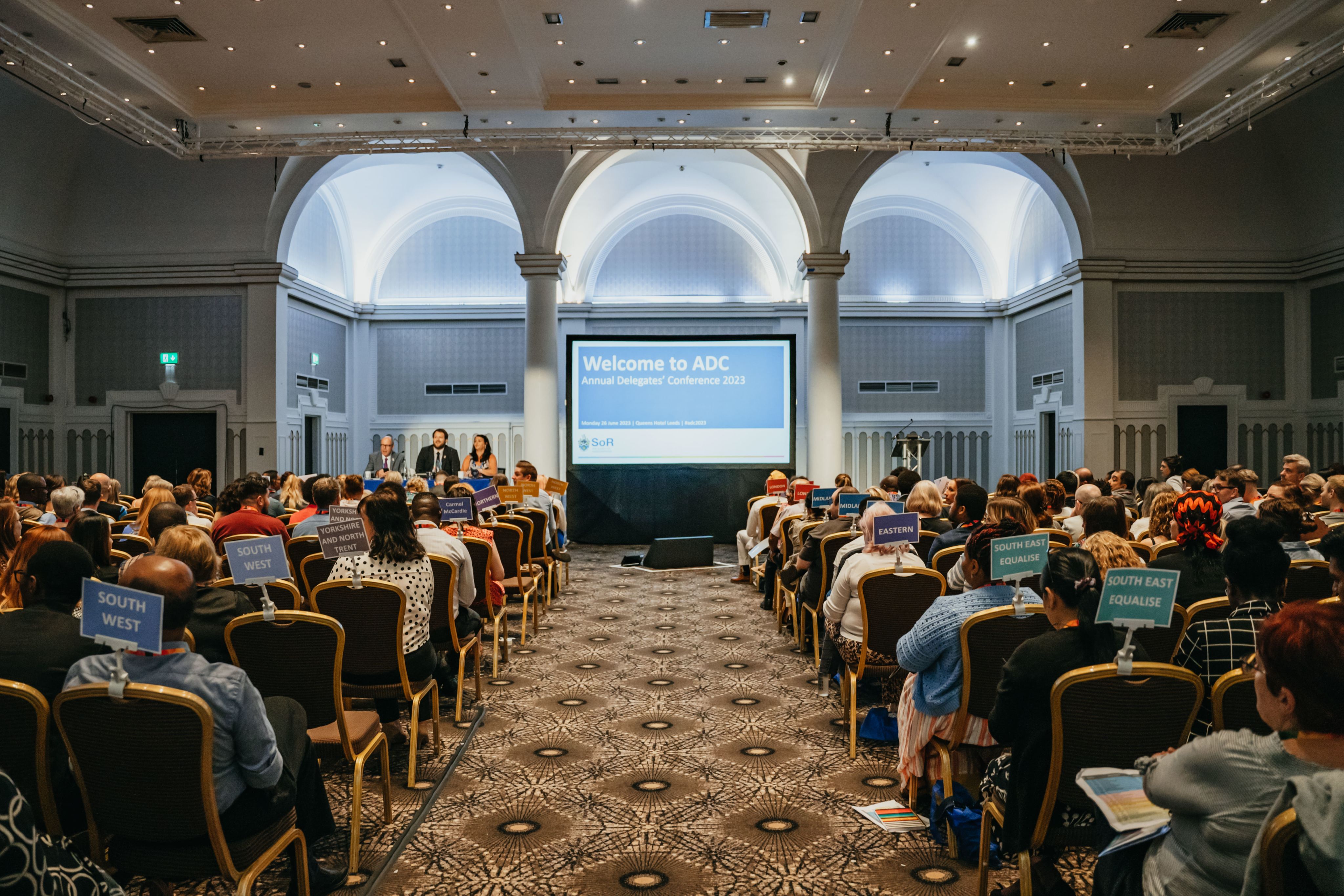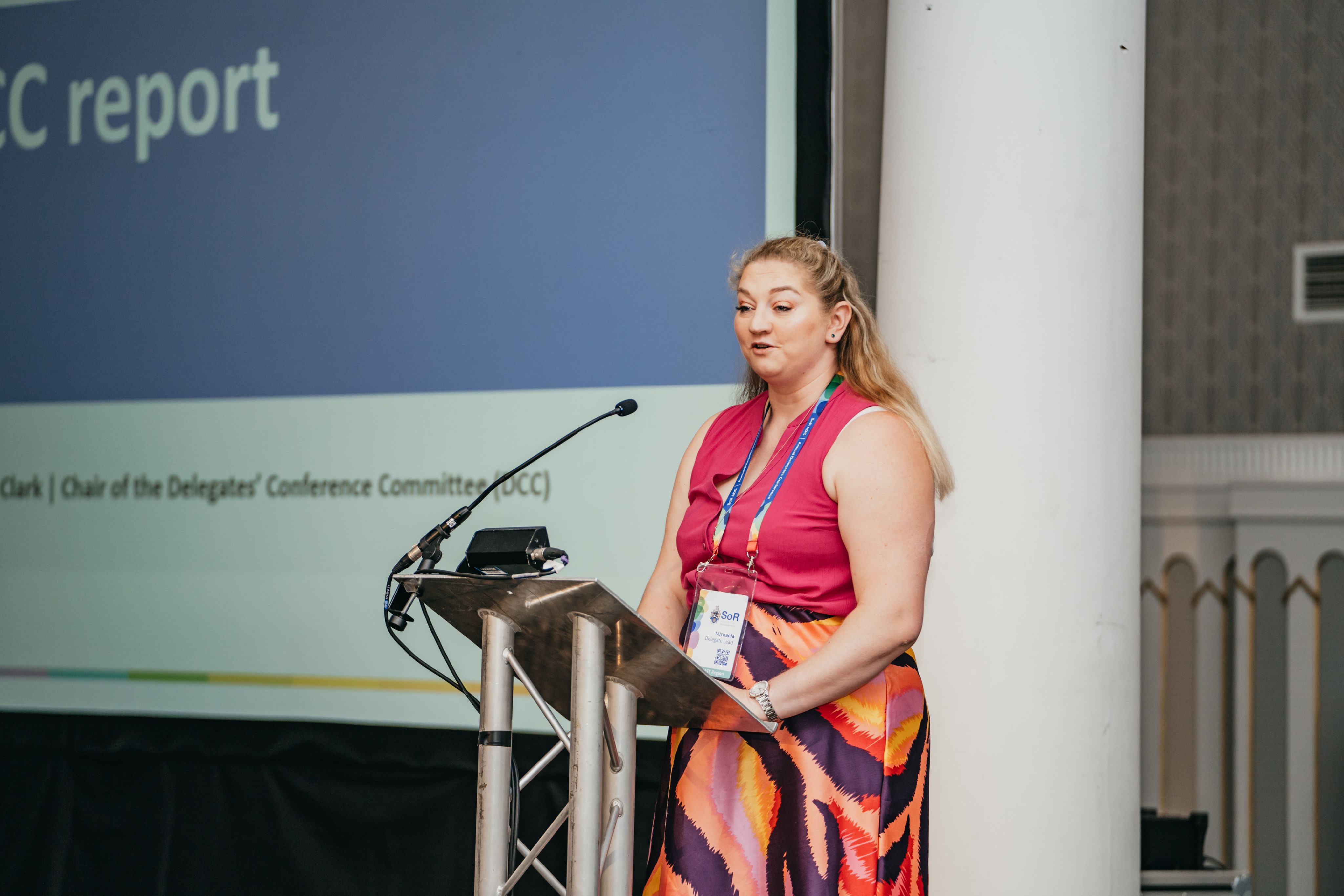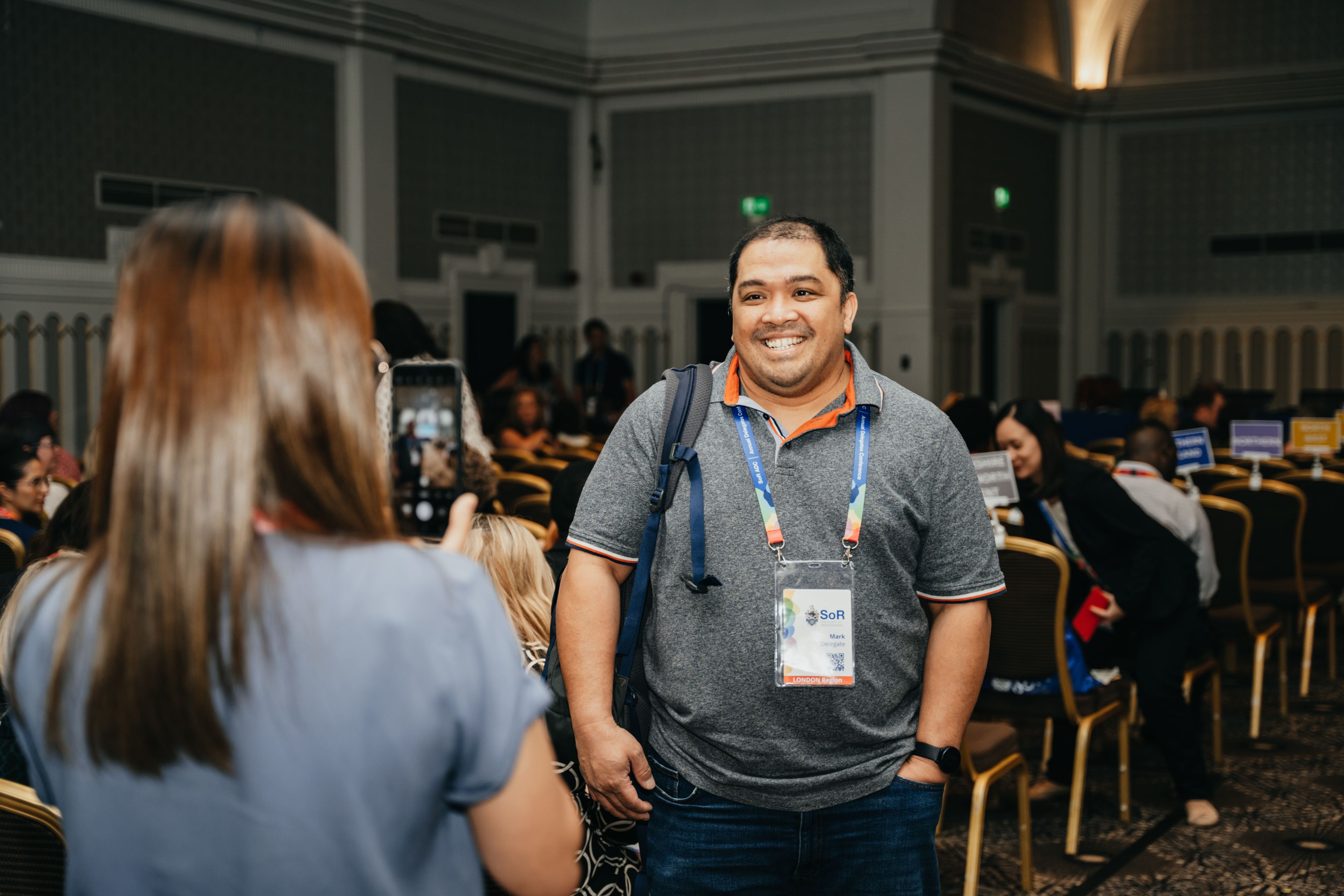Question time
Steering
the Society
Michaela Clark offers insight into the importance of the SoR’s Annual Delegate Conference, which takes place from 15-17 April, 2024

Territory manager for the south of England at private health scan provider Ultrasound Direct, Michaela Clark is also a member of the SoR’s Ultrasound Advisory Group. Michaela also chairs the Society’s Delegate’s Conference Committee, which plans and manages the Annual Delegates Conference (ADC), where members can submit their thoughts on what the agenda of the Society of Radiographers should be for the year ahead.
Michaela sat down with Synergy to tell us more about the ADC, the importance of the conference, and how radiographers can get the most out of the event.
Why is ADC important to the SoR?
The Annual Delegates Conference is our chance to direct the Society’s workforce. What do we want the Society to be working on? Do we want it to be working on things that are ultimately irrelevant to radiography, or do we want it to be focusing its energy?
The SoR manifesto for radiography that is due to be released in February is largely based on what’s been said at ADC again and again, about safe working numbers and safe practice. We’re directing the Society’s business for the year to make sure that we’re getting the best we can out of the Society.
Delegates can submit motions about anything. It doesn’t have to be radiography related – although that would be ideal! If that motion goes through, then that’s what the Society will work on.
What can radiographers look forward to for ADC 2024?
We’re trying to make ADC more of a working conference for the whole three days. We’re thinking about doing some specific, targeted speakers and presentations on the first day that everyone’s there. Obviously we’re going to include the Annual General Meeting at ADC as well, which is a great chance for everyone to have a look at the financial side of the SoR.
We haven’t actually decided on any speakers, on what we’re going to speak about, but we are going to make sure it's applicable to everyone. It won’t just be diagnostic or therapeutic, private or NHS – we’re going to make these speeches appropriate for a wide audience but with a focused idea.
'It’s a great networking event. Everyone’s friendly, so be sociable'
How can people get the most from ADC this year?
It’s a great networking event. Everyone’s friendly, so be sociable. Speak to people, don’t be afraid to go up to people because everyone will talk to everyone. Be mindful though that you are representing hundreds of members. Try not to have a personal agenda, because you are a representative.
Just try to have fun! It’s a professional conference, but everyone is lovely. If you’re writing a speech, try not to leave it until the last minute, because you will have problems.
Get organised, get involved with your delegation, make sure you know who everyone is and they know who you are. I know in our region, we’ve set up a WhatsApp group, so there’s constant communication. I make sure I get to know all the people coming into my delegation so that I can recognise them, have meetings with them and just get to understand them.
What would you personally like to see raised at the conference this year?
In all regions we’ve talked about career progression. There’s now an Agenda for Change for Band five to Band six, but once you’re at Band six there’s very little career progression. A lot of radiographers sit at that level for a lot of their career, and we feel there should be a clear path for that career progression.
Collaboration with the private sector is another big one. There’s things we can learn from each other. I think the Society is seeing that the private sector isn’t the ‘dark side’, it’s not like that any more.
Coming from the private sector, I always want people to know that while we work in collaboration with the NHS, we could never replace it. That’s not what we’re there to do.
We want to make sure our policies are up to date, that we’re following best practice, but we can only do that if everyone is sharing information.
What is the Delegates Conference Committee?
The Conference Committee or DCC is the way that the ADC is organised. Part of that role is making sure the meetings run to time, looking at all the motions that come in, deciding if they’re competent motions, making decisions about the structure and the timeline of the ADC.
We make sure all the motions that are submitted are appropriate and within the Society’s remit of what we can actually do. We also have input on the guest speakers that are attending.
I’ve been elected for two years on the trot now, which is unusual – people don’t often go for it twice! But I really enjoyed it last year, so I’ve done it again.
What was it like the last time you were chair of the DCC?
I did DCC quite a long time ago, when I was the UK Council Observer in 2017. Part of that is that you went to DCC, but you weren’t a DCC elected observer – you were just UK Council, so you sort of had a say, but not really, at the same time.
We got to start thinking about what would be presented as part of the final agenda, and talk to my colleagues about what they want the Society to work on this year, and what we can prioritise.
It’s a really good thing to do. It shows you how ADC is put together, and how much work goes into getting that conference there, making sure everyone’s on time, all the hotel rooms are booked – it’s a massive event. Having that little insight into what the small conference team is doing is really beneficial. It gives you a better perspective of how much work goes into it.
Can you tell us a bit more about what attracted you to radiography?
When I started my A levels, I wasn’t really sure what I wanted to do, but I knew I had an interest in science and the human body, so I just sought out work experience with various people. My mum was a nurse, so I went to do some work experience with her and I didn’t really like it. Nothing against the nursing profession, it just wasn’t for me. Then I went to do some experience with a physio and I thought again, not really for me, but my godfather was a radiographer.
I got some experience with him and I absolutely loved it. I spent two weeks doing work experience with him and it was amazing. It was fast paced, it was fun, and I really loved that patient interaction that he had.
He’s still a working radiographer now, too. He works in the NHS and that is what attracted me. When I started the course, someone came and spoke to us about the Society of Radiographers. I thought, yes, I’ll get involved there, and just have been ever since! I was on a student forum a long time ago and I was a student rep for the South East. When I started working professionally – because I did go into the NHS in X-Ray, and did my ultrasound training there – there wasn’t an industrial relations rep where I was, and I just thought well, we need one.
Can you tell us more about your work with Ultrasound Direct?
I’ve worked for Ultrasound Direct full time since December 2021. I started as a salaried radiographer, before going into the regional ultrasound manager role, and then I recently got promoted to territory manager. Part of that role is that I look after 10 clinics within the South, and I also help out our London branch,
We’re always looking for ways to make the patient pathway better. We do a lot of early scans, and sometimes we see abnormalities. It’s normal as a sonographer to see that, but what happens is that in the NHS, because they don’t trust potentially some private providers, they’re having to scan these people again, and we don’t want that.
At Ultrasound Direct, we pride ourselves on the fact that we only ever employ qualified professionals who are registered. We always watch people scan before we employ them. We really pride ourselves on being the most trusted provider of non-obstetrics and obstetrics scans in the UK.
We have lots of referrals directly to us from the NHS, people that have been outsourced to private IVF companies, and we are doing their scans. What we need is the understanding that not all private companies are employing people that aren’t professionals. We want to make the patient pathway as smooth as possible. We want to work on that referral pathway so people don’t have to be scanned multiple times and delayed before they have treatment.
We aren’t sending patients in for fun. We send them to hospitals because there’s something there.
What role can the private sector play in supporting the NHS?
Our health scans are becoming more and more popular. We are scanning people for abdomens, pelvises, because the NHS wait is just too long for some people. I appreciate that people are fortunate enough to come and pay for our services.
But we are not delaying that pathway for them. If they’ve got gallstones, if they’ve got something wrong with their pelvis, if they’ve got ovarian pathology, we’re providing the report and they can go back to their GP with that to get a direct referral, instead of having to wait for the NHS.
We don’t replace the NHS, but with health scans, we can definitely take some of the burden off the waiting times.
Michaela Clark
Michaela Clark
Find out more...
The Annual Delegates’ Conference (ADC) takes place in April each year and lasts for two to three days. It’s a forum where members can raise subjects for debate that will influence the UK Council’s policy plans for the Society, and also debate and vote on topical issues affecting the profession and/or its members.
Each Regional Committee and National Council sends a delegation to ADC. Delegates are elected within the constituency. The equality network (Equalise) and the UK Council of the Society of Radiographers may also submit motions for debate.
Student members are welcome to join the delegation. It’s important for the organisation that students become involved and influence decisions at all levels. Involvement in the organisation would also look good on your CV!
The 2024 ADC takes place from 15 to 17 April 2024, at The Queen's Hotel in Leeds.
For more information, please see the ADC 2024 web page.
Picture credits: Eva Sulsarek





